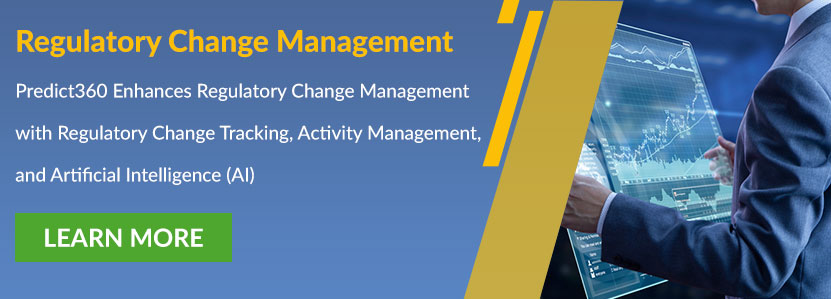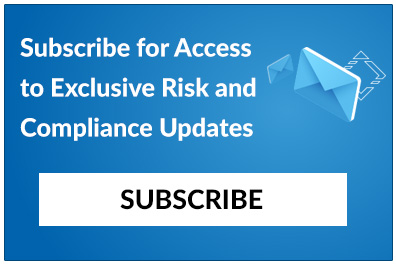Home/ Blog / Regtech, Suptech, and Regulatory Change Management in 2021
The Regtech and Suptech revolution is fully underway in the financial sector ; there has not been this major a change in the way financial organizations manage regulatory changes (and the associated risk and compliance challenges) since the advent of information technology. The adoption of computers across the business world saw the use of advanced analytical capabilities of spreadsheets, the information storage capabilities of digital documentation, and the communication capabilities of emails.
Regtech provides a new way of managing regulatory change, in which intelligently designed A.I. (Artificial Intelligence) powered solutions deliver both automation as well as improved workflows. The Regtech revolution is picking up steam because Regtech solutions are now at the perfect juncture; their costs have gone down significantly while their capabilities have increased substantially. Regtech is changing the way financial organizations operate so impressively that the regulatory bodies now want similar tools for themselves. That is why there is so much talk nowadays about Suptech.

Suptech – What It Means?
Suptech, in its simplest form, refers to supervisory technology, similar to how Regtech refers to regulatory technology. In other words, Suptech solutions are solutions designed to help supervisory activities generally performed by regulatory bodies. This means that instead of regulatory audits being carried out manually by people working for regulatory agencies, financial organizations will be going through digital supervision and monitoring that will automatically detect issues and highlight risks.
An Old Idea That Is Newly Viable
The name Suptech may have been coined recently but the idea has existed almost as long as computer systems became mainstream. A lot of science fiction media includes technologies used to monitor compliance and criminal activities, from the crude systems in popular media like the movie Demolition Man to more sophisticated algorithms in books such as A Scanner Darkly by Philip K. Dick. What has changed, however, is the viability of the idea. Advances in technology mean that instead of just being a part of science fiction Suptech is now an actual technology available to regulatory agencies.
Suptech and Its Importance in 2021
There has been a lot of research into how Suptech can be implemented over the past three years. Financial organizations have been expecting Suptech to appear in the next few years. There have been multiple thought pieces and studies published by many of the biggest financial institutions and agencies in the world such as the World Bank. However, Suptech’s importance has increased exponentially due to the events of 2020.
Suptech solutions are solutions designed to help supervisory activities generally performed by regulatory bodies. Share on XThe Regulatory Challenges of 2020
2020 has been difficult to manage for every part of society, including regulatory bodies. The Covid-19 pandemic created major roadblocks towards efficiently regulatory actions. The regulatory agencies could no longer send out their people to banks under their authority for audits. There were travel restrictions across the country and regulatory agencies wanted to ensure the safety of their employees. Another major problem was that even if the agencies sent their people to other offices, those offices had employees working from home. This meant that many of them were unable to directly provide the information and guidance to the regulatory auditors within office premises.
Different governments took different approaches to ensure regulatory activities could continue throughout the pandemic but most of them had to make many compromises. OECD’s report on regulatory policy responses to Covid-19 talks about many of the compromises that were made in 2020. Many regulatory agencies dedicated their workload to focusing on the pandemic response and skipped many regulatory examinations. Businesses were asked to self-assess, forms were shortened, regulatory reporting requirements were relaxed by giving banks more time to provide the reports or decreasing the amount of reporting required.
Such temporary measures were acceptable because the pandemic was completely unexpected. However, most regulatory bodies have realized that they need a sustainable approach towards supervisory and monitoring activities. Suptech has emerged as a solution to many challenges faced by regulatory bodies in 2020. While the pandemic may soon recede to vaccines being administered across the world, it is critically important for regulatory agencies to plan for a similar situation, so they are never caught unprepared again.
How Suptech Will Work
The idea behind Suptech is simple. Instead of manual auditing and going through reports, financial organizations will stream real-time data to regulatory agencies. This means that instead of periodic audits, the regulatory bodies will be able to detect problems in real-time. This approach will be fully automated, but it is not necessarily how the system will begin. Technological changes generally happen gradually. It will not be a surprise if the first Suptech solutions are more of a stopgap measure and will be focused on digital audits of digital report and documents submitted by financial organizations.
Regtech will play a significant role in helping businesses ensure minimum regulatory interventions. Regtech solutions already do what Suptech solutions are aimed at doing, but they report everything internally. This means that businesses that use Regtech solutions will eventually be able to detect problems that would be caught by Suptech solutions before they reach the Suptech monitoring solution.
That is what makes this such a wonderful time to ensure there is a Regtech based regulatory management framework in place within your organization. Interested in seeing how your business can start using Regtech solutions? Get in touch with our Regtech experts for a demonstration of the Predict360 Risk and Compliance Intelligence platform.
Request a Demo
Complete the form below and our business team will be in touch to schedule a product demo.
By clicking ‘SUBMIT’ you agree to our Privacy Policy.




